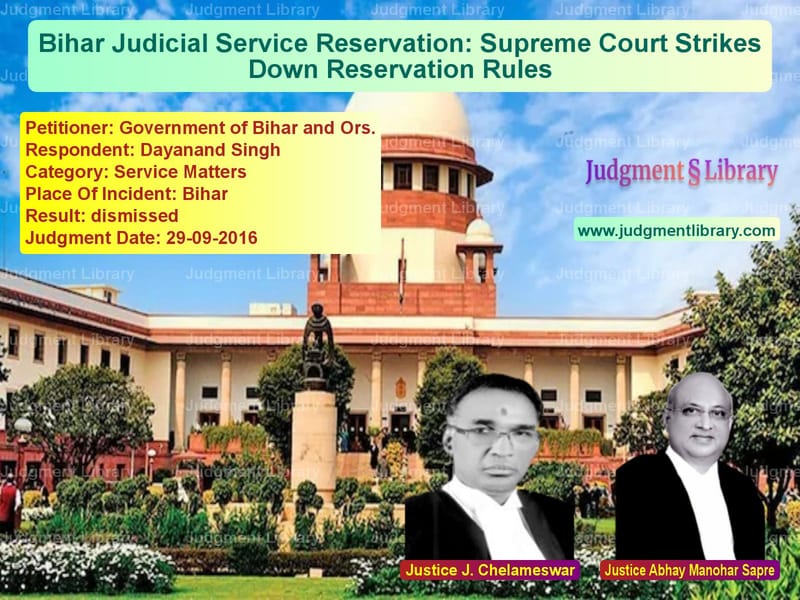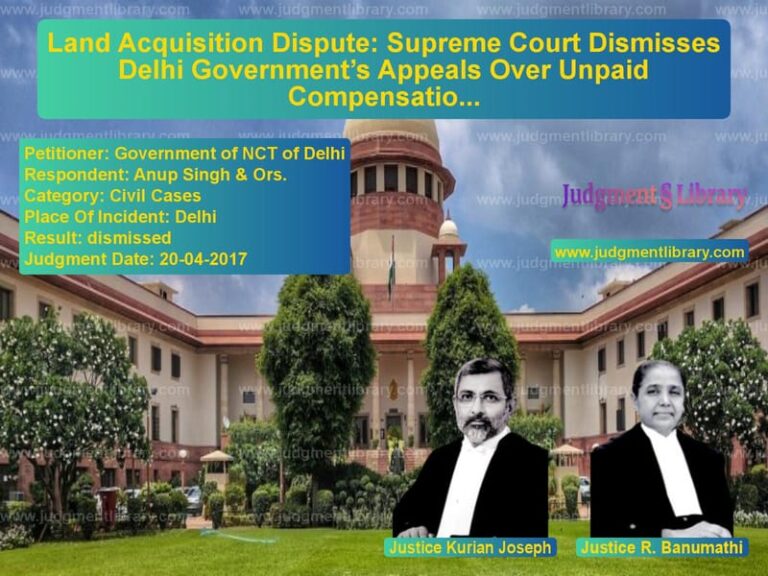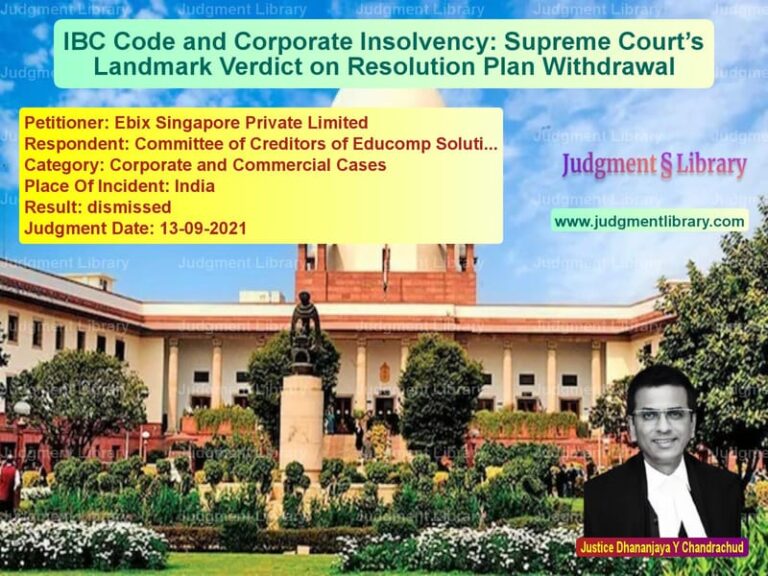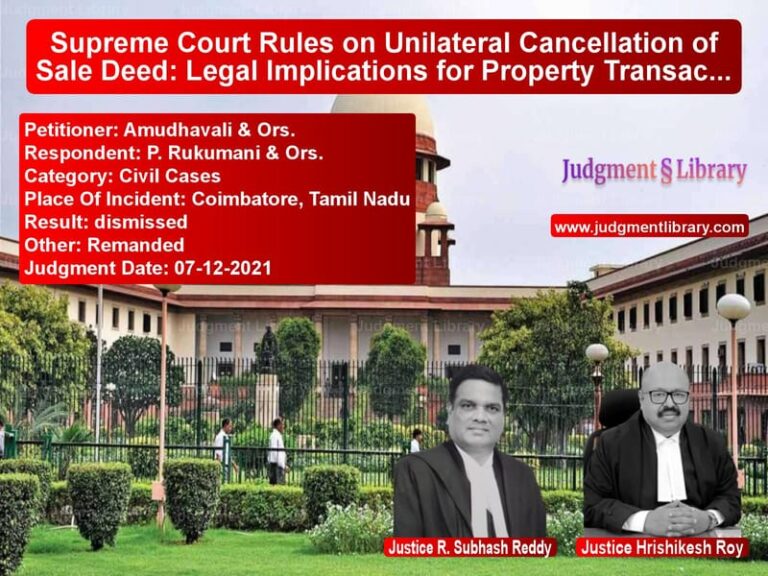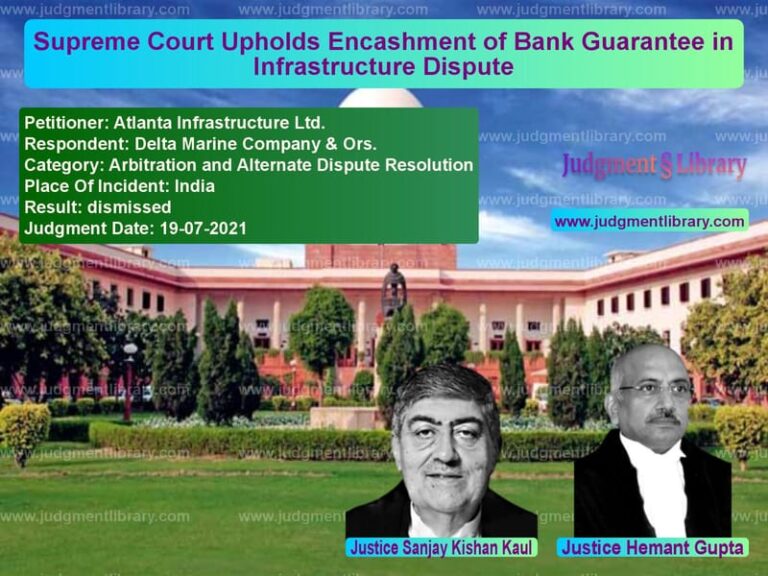Bihar Judicial Service Reservation: Supreme Court Strikes Down Reservation Rules
The case of Government of Bihar and Ors. vs. Dayanand Singh revolved around the legality of providing reservations for Scheduled Castes (SC), Scheduled Tribes (ST), and Other Backward Classes (OBC) in the Judicial Services of Bihar. The Supreme Court had to decide whether the Bihar government’s amendments to the judicial service rules, which provided reservations, were constitutional.
Background of the Case
Prior to 1991, the Bihar judicial service rules provided reservations only for SC and ST candidates. However, in 1991, the Bihar government enacted the Bihar Reservation of Vacancies in Posts and Services Act, extending reservations to OBCs and other backward communities.
The primary issue in this case was whether this Act applied to judicial services, which include both superior and subordinate judiciary positions.
Legal Challenge
The case was originally decided in State of Bihar & Another vs. Bal Mukund Sah (2000) 4 SCC 640, where the Supreme Court ruled that the Act applied to judicial services. However, the Court also held that applying reservations in judicial appointments without consultation with the High Court was unconstitutional.
Amendments to Bihar Judicial Service Rules
In 2009, the Bihar government amended two key rules:
- Bihar Superior Judicial Service Rules, 1951 (introducing Rule 4A)
- Bihar Civil Services (Judicial Branch) Recruitment Rules, 1965 (introducing Rule 3A)
These amendments sought to apply reservation quotas to direct recruitment in the judicial services.
High Court’s Ruling
- The amendments were challenged in the Patna High Court, which quashed them.
- The court ruled that the amendments were unconstitutional as they were enacted without proper consultation with the High Court.
- The High Court emphasized that judicial appointments must follow Articles 233 and 234 of the Constitution, which require the Governor to consult the High Court.
Supreme Court’s Judgment
The Supreme Court agreed with the High Court’s ruling and held that the amendments were illegal and unconstitutional. The key points from the judgment were:
- The Supreme Court ruled that the Bihar government had failed to properly consult the High Court before introducing reservations in the judicial services.
- The Court emphasized that while the government has the power to introduce reservations, it must follow constitutional procedures, including consulting the High Court.
- The judgment clarified that only the Governor of Bihar can make rules regarding judicial appointments, and these must be framed in consultation with the High Court.
- The Supreme Court also ruled that the government must base any reservation policy on empirical data showing the inadequate representation of backward classes in judicial services.
Impact on Judicial Appointments
The judgment also affected ongoing recruitment processes:
- The Bihar government had initiated recruitment in 2009 for 217 judicial positions and in 2012 for 118 more.
- The Supreme Court noted that the 2009 recruitment process was complete and unaffected.
- For the 2012 batch, the Court ruled that only 88 candidates had been appointed, and four did not join.
- The Court ruled that new appointments should proceed without applying the struck-down reservation rules.
Future Course of Action
The Supreme Court provided guidelines for implementing future reservation policies in judicial services:
- The Bihar government must initiate a formal consultation process with the High Court.
- The government must present data showing underrepresentation of backward classes in the judicial services.
- The High Court must review this data and provide its opinion.
- If the government and High Court agree, new reservation rules can be framed.
- In case of disagreement, the government must provide reasons and ensure compliance with constitutional principles.
Final Ruling
- The Supreme Court upheld the Patna High Court’s decision striking down Bihar’s judicial service reservation rules.
- The government was directed to complete the process of reviewing judicial service reservations by January 1, 2017.
- The Court ordered the Bihar Public Service Commission to complete the recruitment process for new judicial officers by June 30, 2017.
Conclusion
The Supreme Court’s ruling reaffirmed the constitutional framework for judicial appointments. It emphasized the necessity of following Articles 233 and 234 while making judicial service rules and ensuring proper consultation with the High Court. The judgment serves as a critical precedent for maintaining the independence of the judiciary while balancing the need for social justice through reservations.
Don’t miss out on the full details! Download the complete judgment in PDF format below and gain valuable insights instantly!
Download Judgment: Government of Bihar vs Dayanand Singh Supreme Court of India Judgment Dated 29-09-2016-1741883946580.pdf
Direct Downlaod Judgment: Direct downlaod this Judgment
See all petitions in Employment Disputes
See all petitions in Recruitment Policies
See all petitions in Public Sector Employees
See all petitions in Judgment by J. Chelameswar
See all petitions in Judgment by Abhay Manohar Sapre
See all petitions in dismissed
See all petitions in supreme court of India judgments September 2016
See all petitions in 2016 judgments
See all posts in Service Matters Category
See all allowed petitions in Service Matters Category
See all Dismissed petitions in Service Matters Category
See all partially allowed petitions in Service Matters Category

